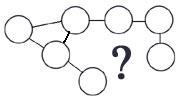Yesterday, when talking with Richard and Marshall about Google’s plans to open up many of their services that deal with personal and social information, I made this remark: “Also, as an aside, I’d like to express my severe dislike for the term ‘social graph.'”

I first remember hearing about the term “social graph” in May while Mark Zuckerberg was on stage announcing the Facebook Platform. That probably wasn’t the first time the term was used, but it seems to be the time it entered our collective conscience and started being used with more regularity. At the time, I remember thinking to myself, “wait, what’s a social graph?” It seems I wasn’t alone in my confusion. The social graph is a reference to graph theory, which in general, if I understand correctly, models connections between things. There’s really nothing wrong with this term, but it’s math or computer science phraseology and doesn’t do very well as a marketing term, in my opinion.
As Dave Winer points out in a post yesterday, most instances of the term “social graph” floating around the web since May are interchangeable with the term “social network” — they mean more or less the same thing:
“Now if you showed that diagram to most educated people, they probably would call it a network, and before we talked about social graphs we called them social networks, and you know what — they’re exactly the same thing, and social network is a much less confusing term, so why don’t we just stick with it? (Answer: we should, imho.) So if you don’t want to sound like an idiot, call a social graph a social network and stand up for your right to understand technology, and make the techies actually do some useful stuff instead of making simple stuff sound complicated.” — Dave Winer
Not everyone agrees with Winer. Robert Scoble posted a response today in which he says that your social network is who you know, while your social graph is who you’re connected to based on interests, location, work, etc. “The Social Graph is NOT my social network,” Scoble writes. “My Social Network is my friends list. But the Social Graph shows a LOT more than that.”
Scoble might be right. Or Winer might be. But semantic arguments aside, I think the first commenter on Scoble’s post sums it up nicely:
“When I first heard the term social graph my thought was ‘what now?’, graph did not resonate at all. It still doesnÄôt.” — PXLated
Everyone already understood what a social network was — it’s a term we’ve been using for years. Everyone knows about networking. When you go schmooze with your peers at a party you’re networking, not graphing. Most people don’t get “social graph” the way they do “social network.”
As Tom Morris, a commenter on Nick Carr’s post on the debate says, “The fact is that the phrase ‘social network data’ describes everything that ‘social graph’ does without having to explain graph theory to those who don’t understand it.” Yes! Social graph may be a valuable way to talk about this stuff with mathematicians, but it is still a poor choice as a marketing term. I think it’s time we retire it (at least in anything that isn’t targeted toward computer scientists) and return to saying social network. How about it?

















